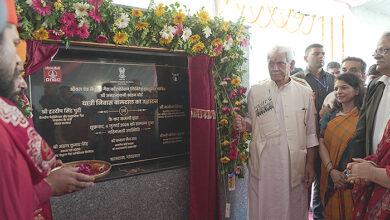Tamil Nadu Second State, After Maharashtra, To Announce More Ambitious Carbon Neutrality Target Than National One
Aim to achieve 50% generation of electricity through RE by 2030, Rajesh Lakhani, Chairman, TANGEDCO

Tamil Nadu’s chief minister, M K Stalin recently announced that “Tamil Nadu will achieve its net zero goal before India’s proposed target (of 2070)”. Making TN the second state, after Maharashtra’s 2050 deadline, to announce a more ambitious carbon neutrality target than the national one. These are the numbers which will add up to help India achieve its net-zero goal ahead of target.
With India’s ambitious commitments for climate action, it is clear that the buck stops at subnational action and how the numbers break down amidst state climate action. Market and policy signals are clear that first movers and shakers will have the benefit of the future technologies, investments and job opportunities.
Along with the setting up of a Climate Change Mission which will carry out the implementation of the State Action Plan for Climate Change, the TANGEDCO Chairman Rajesh Lakhani also said, “We aim to achieve 50% generation of electricity through renewable energy in Tamil Nadu by 2030. Moreover, to ensure we achieve the state’s decarbonisation plans, we commit to no new coal plants in Tamil Nadu barring the ones, which have already been commissioned.”
During the landfall of cyclone Mandous, the state government has re-emphasised its preparedness and commitment to work towards climate resilience with the launch of the Tamil Nadu Climate Change Mission.The announcement comes close at the heels of India taking on the G20 presidency. At the end of a two day Tamil Nadu Climate Summit held in Chennai to discuss the state’s climate related milestones, achievements and hurdles. The state, which is already considered to be a leader in terms of climate action in the country, had launched the Wetlands Mission and Green Tamil Nadu Mission in August and September of this year respectively.
The Tamil Nadu Green Climate Company (TNGCC) will carry out the implementation of the State Climate Action Plan Under the Climate Change Mission. The state was also the first to establish a Governing Council for Climate Change under the leadership of its Chief Minister.
At a time when India is on the pathway to achieving net zero emission by 2070, it is crucial that states work towards subnational goals. The key goals of this climate change mission are to formulate plans to reduce overall greenhouse gas emissions in Tamil Nadu. The state it seems is committed towards a renewables focussed future and aim to achieve 50% generation of electricity through renewable energy in Tamil Nadu by 2030. Moreover, to ensure to achieve the state’s decarbonisation plans, the state has commit tono new coal plants in Tamil Nadu barring the ones, which have already been commissioned.
According to the Rajesh Lakhani, Chairman of TANGEDCO Over the last few years, states have stepped up their commitments towards India’s decarbonisation plans. In 2019, Gujarat announced that it will not build any new coal plants. In the same year, Chhattisgarh made a similar announcement stressing it would focus on solar. In 2021, Maharashtra announced that it would not install any new coal capacity, and would invest in 25GW of solar power for its growing demand. Tamil Nadu could be the 4th state to claim a ‘no new coal’ status, albeit with caveats.
While Tamil Nadu is one of the leaders when it comes to renewable energy, it has installed 16 GW as of March 2022, which accounts for 75% of its 2022 targets according to recent analysis. TN has a potential of 88.7 GW of solar capacity estimated as of March 2021. According to the Tamil Nadu Wind Energy Roadmap Harnessing Net Zero Opportunities released in Chennai today, the state has a potential of 68GW (Onshore) and 35 GW (Offshore) that is waiting to be tapped. If the state stays true to its energy transition commitments and potential, it can not only feed its entire power and industry needs with clean energy, but also be a leader in India’s 500GW of non-fossil fuel based electricity share.
Tamil Nadu is one of the leaders when it comes to renewable energy, it has installed 16 GW as of March 2022, which accounts for 75% of its 2022 targets. TN has a potential of 88.7 GW of solar capacity estimated as of March 2021. Just in wind energy, Tamil Nadu could become pivotal across Asia with a potential of 68GW (Onshore) and 35 GW (Offshore) that is waiting to be tapped.
The writer of this article is Dr. Seema Javed, a known Environmentalist, Journalist and Communications Expert




